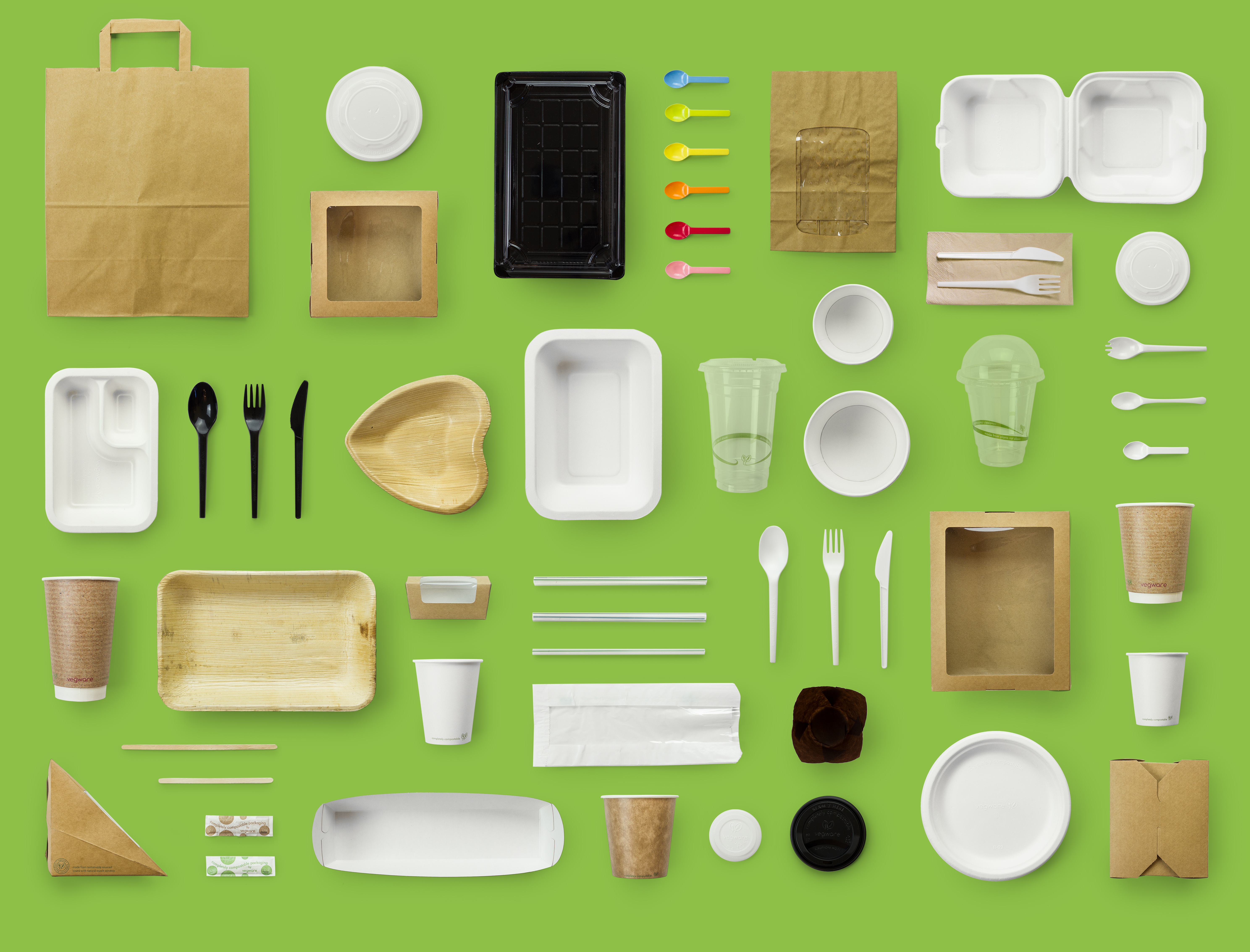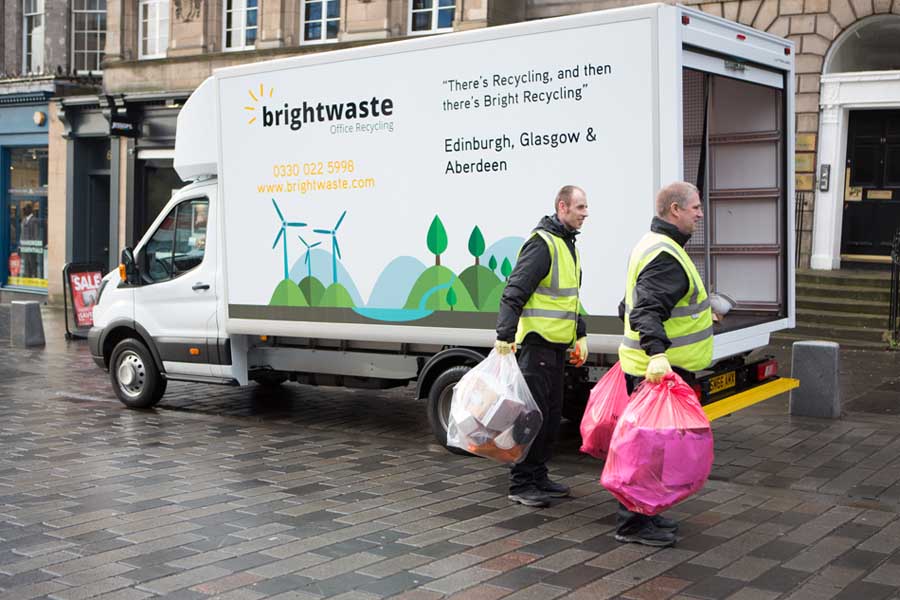 • Vegware welcomes the much-needed focus on recycling, but instead of charging consumers, Vegware supports reforms to have industry pay for recycling
• Vegware welcomes the much-needed focus on recycling, but instead of charging consumers, Vegware supports reforms to have industry pay for recycling
• State-of-the art cup recycling can be complemented through the use of compostable foodservice packaging; compostables can Close the Loop for all foodservice waste
• Packaging company Vegware to expand Close the Loop composting collections
Vegware wholeheartedly supports any initiative that boosts recycling. The public and businesses are all eager for a solution. The UK Environmental Audit Committee has recommended a 25p ‘latte levy’ on any disposable coffee cup. Whilst the report raises many valid points about the challenges we face, we do not see a ‘latte levy’ as the most effective way forward. Vegware support’s the Foodservice Packaging Association’s response, ‘Why charge consumers 25 pence a cup when industry is willing to provide funding for recycling’. In addition, Vegware would like to highlight the opportunity that compostable packaging brings to recycling of all foodservice waste, not only cups.
In 2017 there were great strides in recycling used coffee cups by major chains and independents alike. Food contamination is cited in the report as a major issue. To complement cup and other dry recycling, industrial composting is a form of recycling with a major role to play here. If all disposables are compostable, all foodservice waste – the cup, lid, spoon and sandwich wedge, leftover crusts and mayo – can be composted together, and food contamination is no longer an issue.
Vegware takes its producer responsibility seriously, and offers expert environmental support to help foodservice clients recycle used Vegware and food waste. Launched initially in Scotland in 2017, Vegware’s Close the Loop service collects used compostables and food waste from Vegware clients, taking it for commercial composting. Now that we have a successful model to roll out, Vegware will be announcing good news in other areas of the UK in 2018.
To see a true shift in foodservice recycling and litter reduction, Vegware believes a comprehensive raft of improvements are needed to recycling systems and major public awareness campaigns. We welcome ambitious plans and are keen to drive innovation and collaboration in the packaging and recycling sectors.
 Vegware, the Edinburgh compostable packaging manufacturer, has launched a new composting collection service for its catering disposables.
Vegware, the Edinburgh compostable packaging manufacturer, has launched a new composting collection service for its catering disposables.
The ‘Close the Loop’ service now means that composting collections are available to businesses across Scotland, taking used Vegware and food waste for industrial composting into high-grade horticultural compost. Cup recycling hit the headlines when it was revealed that, of the 2.5bn cups used in the UK every year, fewer than 1 in 400 paper cups are recycled. Launched to mark Recycle Week and International Coffee Day, Vegware’s compostable solution enables foodservice to recycle all takeaway packaging, not just cups.
Eilidh Brunton, Vegware’s group recycling consultant, explained: “There are now some initiatives to separate out and recycle plastic-lined paper cups. That is a good start, but what about the lid, tea bag, stirrer, spoon and sandwich box? In reality, used takeaway packaging is a mix of materials contaminated with food, and goes to incineration or landfill. Our approach is simple: if it’s all made from plants, not plastic, and can be composted together with food waste, then there’s no sorting. All used takeaway items go together with food waste, and can be processed at industrial composting facilities around the UK in under 12 weeks. Catering waste can create high-grade horticultural compost, to feed the next generation of plants.”
Starting in the Edinburgh firm’s home turf, Vegware has launched its own collection service to demonstrate producer responsibility and make collections accessible to more Scottish businesses. Run by the disposables manufacturer itself, Close the Loop understands the best facilities to process compostable packaging and food waste. Waste from the Central Belt is composted at GP Green Recycling, near Glasgow. Initial Close the Loop clients include the Glasgow Science Centre and independent Edinburgh cafes Union of Genius and Pumpkin Brown. Close the Loop is a disruptive model, a waste service which is flexible and competitively priced. Clients choose any collection day and have no contract ties.
Vegware has set up zero waste systems with collections for clients around the UK, including corporate clients from London to Aberdeen, and food fairs at River Cottage. Dundee and Angus College composts its disposables on-site, creating quality mulch in 14 days for its horticultural courses.
Edinburgh Coffee Festival, on 14th October 2017, is aiming to be the UK’s first zero waste coffee festival, with support from Vegware and Close the Loop. Vegware’s Environmental team has provided consultancy, signage and training, and all traders will be using compostable cups, lids and assorted disposables. All food waste, coffee grounds and used Vegware will be collected in Close the Loop bins and composted near Glasgow into high-grade horticultural compost.
Edinburgh Coffee Festival organiser Martin Dare, said: “We understand the challenges of recycling coffee cups, but it’s only through working with Vegware that we have found a solution to allow Edinburgh Coffee Festival to truly go zero waste. Cups are talked about the most, but making everything compostable keeps recycling simple. The measures we’re taking at the Festival are designed to demonstrate to a wider audience what compostables can achieve.”
Vegware has made a short animation for social media introducing Close the Loop and exploring why recycling goes beyond cups: https://youtu.be/Nd53i9Gw3GE.
 Let’s face it, office recycling can be a chore.
Let’s face it, office recycling can be a chore.
You have your meal deal lunch at your desk. You know you can recycle the plastic bottle, but you’re not really sure about the crisp packet and the half-cardboard half-perspex sandwich wrapper.
You need to get on with your work, so you just find the nearest bin, throw it all in and focus on more pressing matters.
But here’s the thing. BY LAW offices have to recycle. The Scottish government has set a 70% target for recycling, and the pressure at work is going to get greater and greater for easy, instinctive recycling systems.
And your commercial cleaning company should help and encourage you to do the right thing.
So, here’s the Ten Point Office Recycling Plan from Spotless for all businesses who want to do office recycling correctly.
1. Understand the benefits of recycling. Recycled waste costs about 25% less than general waste. Why? Because recycled waste does not have an inbuilt landfill levy. Instead, the waste can be sold as a commodity and this discounts the collection costs.
2. Set a recycling target. We recommend that you align with the government target of 7 bags of recycling waste for every 3 sacks of general waste.
3. Get great bins to help you. Spotless works with (actually owns) Brightwaste who can supply FREE bins and FREE recycling advice for your office. Sometimes this will be neat cardboard bins. Sometimes really smart, airport-style bins for segregated waste.
4. Do away with bins under desks. 20 years ago every office had desk bins. Now 60% of offices use central bins, often reducing their office cleaning costs. Place the recycling bins strategically around the office. Keep them in areas where most of the waste is generated such as photocopying, meeting and breakout rooms, as well as cafes.
5. Get free help. Ask your waste company to come in and talk to your staff. Brightwaste Office Recycling offer this service for free.
6. Launch and promote your recycling initiative to staff. Hold a launch event to share the value and objectives. It’s worth including helpful (and humorous) messages using posters and stickers with gentle reminders on the benefits and desired outcomes.
7. Motivate your staff by linking recycling with valued charitable causes. Electronic products like PCs, laptops and mobile phones, as well as ink cartridges, can be donated to charities. Redundant office furniture can also go to charities.
8. Discuss and agree the collection strategy with your waste company. Kerbside collection or car park collection? And if car park, what size of bine suits? Make sure you’re not being miss-sold a bin that is too big for your needs.
9. Obtain data from your waste company. Ask them for a carbon report to show comparatives on your recycling between any 2 dates.
10. Lastly, find ways to reduce your waste and recycling output before it hits the bins. A creative team review will allow you to find more ways to reduce waste so that you don’t have to bin it: print less and on both sides; reuse plastic containers; maintain and upgrade computers to extend their lives.
You may not know that methane is produced in landfill from biodegradable waste, and methane is 23 times as potent as a greenhouse gas compared to carbon dioxide.
You may not be aware that making new products from recycled materials requires much less energy than manufacturing from virgin materials. For example, recycling aluminium into new cans needs 95% less energy than processing the raw material, bauxite ore, into aluminium.
If you get the recycling basics right, it doesn’t need to be a chore. Instinctively you will learn what to recycle and what not to.
Eventually you’ll find that the cost savings are not the motivation. It’s not even the fact that you are legally compliant. It’s simply the fact that you know you are doing the right thing for the environment, and you are doing it well.
If you genuinely get your staff on board, you’ll turn recycling into a mission.
Ask Spotless Commercial Cleaning or its sister company, Brightwaste Office Recycling, for a free recycling review.





